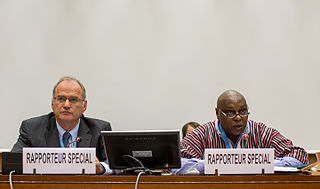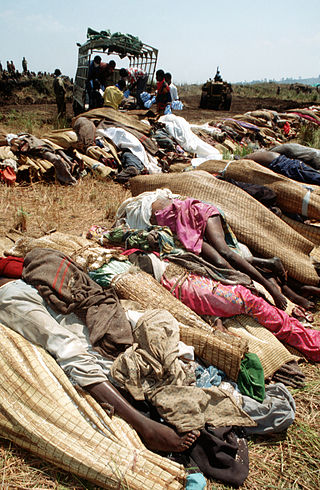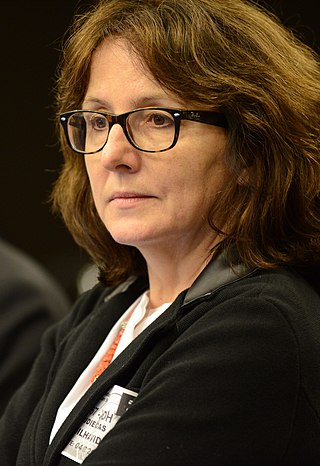The United Nations Commission on Human Rights (UNCHR) was a functional commission within the overall framework of the United Nations from 1946 until it was replaced by the United Nations Human Rights Council in 2006. It was a subsidiary body of the UN Economic and Social Council (ECOSOC), and was also assisted in its work by the Office of the United Nations High Commissioner for Human Rights (UNOHCHR). It was the UN's principal mechanism and international forum concerned with the promotion and protection of human rights.

The United Nations Human Rights Council (UNHRC) is a United Nations body whose mission is to promote and protect human rights around the world. The Council has 47 members elected for staggered three-year terms on a regional group basis. The headquarters of the Council are at the United Nations Office at Geneva in Switzerland.

Special rapporteur is the title given to independent human rights experts whose expertise is called upon by the United Nations to report or advise on human rights from a thematic or country-specific perspective.

The Convention on the Elimination of all Forms of Discrimination Against Women (CEDAW) is an international treaty adopted in 1979 by the United Nations General Assembly. Described as an international bill of rights for women, it was instituted on 3 September 1981 and has been ratified by 189 states. Over fifty countries that have ratified the convention have done so subject to certain declarations, reservations, and objections, including 38 countries who rejected the enforcement article 29, which addresses means of settlement for disputes concerning the interpretation or application of the convention. Australia's declaration noted the limitations on central government power resulting from its federal constitutional system. The United States and Palau have signed, but not ratified the treaty. The Holy See, Iran, Somalia, Sudan, and Tonga are not signatories to CEDAW.
The Vienna Declaration and Programme of Action (VDPA) is a human rights declaration adopted by consensus at the World Conference on Human Rights on 25 June 1993 in Vienna, Austria. The position of United Nations High Commissioner for Human Rights was recommended by this Declaration and subsequently created by General Assembly Resolution 48/141.
A human rights defender or human rights activist is a person who, individually or with others, acts to promote or protect human rights. They can be journalists, environmentalists, whistleblowers, trade unionists, lawyers, teachers, housing campaigners, participants in direct action, or just individuals acting alone. They can defend rights as part of their jobs or in a voluntary capacity. As a result of their activities, human rights defenders (HRDs) are often subjected to reprisals including smears, surveillance, harassment, false charges, arbitrary detention, restrictions on the right to freedom of association, physical attack, and even murder. In 2020, at least 331 HRDs were murdered in 25 countries. The international community and some national governments have attempted to respond to this violence through various protections, but violence against HRDs continues to rise. Women human rights defenders and environmental human rights defenders face greater repression and risks than human rights defenders working on other issues.
Deshamanya Radhika Coomaraswamy is a Sri Lankan lawyer, diplomat and human rights advocate who served as the Under-Secretary-General of the United Nations, Special Representative for Children and Armed Conflict until 13 July 2012. Secretary-General Kofi Annan appointed her to the position in April 2006. She was nominated to the Constitutional Council as a civil representative on 10 September 2015. In 2017, after atrocities against the Rohingya people, she was appointed a Member of the United Nations Fact Finding Mission on Myanmar.
Marta Santos Pais a Portuguese lawyer who has served as Special Representative of the United Nations Secretary-General on Violence against Children from September 2009 until May 2019.
The Declaration on the Elimination of Violence Against Women was adopted without a vote by the United Nations General Assembly in the 48/104 resolution of 20 December 1993. Contained within it is the recognition of "the urgent need for the universal application to women of the rights and principles with regard to equality, security, liberty, integrity and dignity of all human beings". It recalls and embodies the same rights and principles as those enshrined in such instruments as the Universal Declaration of Human Rights, and Articles 1 and 2 provide the most widely used definition of violence against women.

United Nations Security Council resolution 925, adopted unanimously on 8 June 1994, after reaffirming all resolutions on the situation in Rwanda, particularly resolutions 912 (1994) and 918 (1994), and Resolution 868 (1993) on the safety of United Nations peacekeepers, the council deployed additional battalions and extended the mandate of the United Nations Assistance Mission for Rwanda (UNAMIR) until 9 December 1994.
The right to sexuality incorporates the right to express one's sexuality and to be free from discrimination on the grounds of sexual orientation. Specifically, it relates to the human rights of people of diverse sexual orientations, including lesbian, gay, bisexual and transgender (LGBT) people, and the protection of those rights, although it is equally applicable to heterosexuality. The right to sexuality and freedom from discrimination on the grounds of sexual orientation is based on the universality of human rights and the inalienable nature of rights belonging to every person by virtue of being human.
The term international framework of sexual violence refers to the collection of international legal instruments – such as treaties, conventions, protocols, case law, declarations, resolutions and recommendations – developed in the 20th and 21st century to address the problem of sexual violence. The framework seeks to establish and recognise the right all human beings to not experience sexual violence, to prevent sexual violence from being committed wherever possible, to punish perpetrators of sexual violence, and to provide care for victims of sexual violence. The standards set by this framework are intended to be adopted and implemented by governments around the world in order to protect their citizens against sexual violence.
Saudi Arabia has implemented its anti-domestic violence law in 2014. It is thought that in Saudi Arabia it is socially acceptable to hit women or children to discipline them, and while the older generations do hit children and some of them may hit women, the younger generations are generally growing out of the habit of hitting children and women as it is considered taboo, unethical, and inhuman.

Rashida Manjoo is an Emeritus Professor at the University of Cape Town in Cape Town and a social activist involved in the eradication of violence against women and gender-based violence. Manjoo was the United Nations' Special Rapporteur on Violence Against Women from June 2009 to July 2015.
University of Oslo's Human Rights Award honours individuals who have made important contributions in different fields. The award was launched in 1986 and since then, it is awarded every year to notable people from different walks of life. Those years when the award was not distributed are 1997, 1999, 2003, and 2004.
Tejshree Thapa was a Nepalese human rights lawyer. She was recognized for her role in investigating and documenting human rights violations, including widespread sexual violence and other atrocities committed during the Yugoslav Wars, the Sri Lanka Civil War, and the Nepal Civil War.
Yakin Ertürk is a Turkish former United Nations special rapporteur on violence against women and board member of the United Nations Research Institute for Social Development (UNRISD), and was a professor of Sociology.

Dubravka Šimonović is a Croatian jurist and specialist in human rights. She was appointed on 1 August 2015 as the United Nations Special Rapporteur on Violence Against Women, and is Visiting Professor in Practice in the Centre for Women, Peace and Security at the London School of Economics.
Reem Alsalem is a Jordanian independent consultant and former civil servant. Since August 2021 she has served as the United Nations Special Rapporteur on violence against women and girls.
![<span class="mw-page-title-main">Roses Revolution</span> International movement against [[obstetric violence]]](https://upload.wikimedia.org/wikipedia/commons/thumb/7/75/Rose_ViennaGeneralHospital.jpg/320px-Rose_ViennaGeneralHospital.jpg)
Roses Revolution is an international movement against obstetric violence, originally founded in Spain in 2011. It observes November 25, the International Day for the Elimination of Violence against Women, additionally as "Roses Revolution Day". Women place roses outside the hospitals where they suffered varying forms of physical or psychological violence as a sign of protest.







![<span class="mw-page-title-main">Roses Revolution</span> International movement against [[obstetric violence]]](https://upload.wikimedia.org/wikipedia/commons/thumb/7/75/Rose_ViennaGeneralHospital.jpg/320px-Rose_ViennaGeneralHospital.jpg)